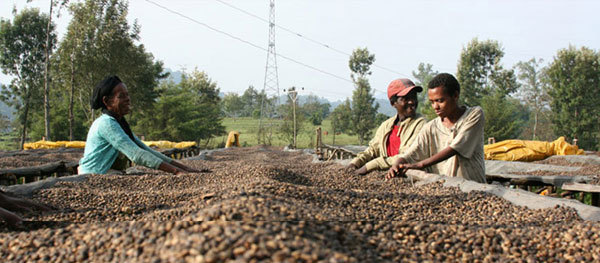Introduction to the characteristic varieties of Ugandan Coffee Flavor Manor
There was an emirate called Kitala in present-day western Uganda before the 13th century AD. In the 13th and 14th century, the nomadic Bachwezi conquered the country. From the end of the 15th century to the beginning of the 16th century, the Luo people who originally lived in southern Sudan went south to replace the rule of the Bachwezi, established the kingdom of Buniolo and established the Babito dynasty in Buganda. These foreign rulers were soon assimilated by the local Bantu people who were engaged in agriculture and were more educated. In southwestern Uganda, the Xinda established the Kingdom of Ankolai. In northern Uganda, many separate small countries and clan tribes have been established. Around 1830, Prince Capoyo of the Kingdom of Bunioro established the Toro Kingdom east of Mount Ruwenzori. Since the 17th century, the kingdom of Buganda has grown stronger and expanded outward. By the middle of the 18th century, its power had surpassed that of the Ugandan people in the Kingdom of Bunioro and had tenaciously resisted the British aggression. In 1893, Britain sent troops to occupy the Kingdom of Bunioro, and King Kabarega led some of the people to wage guerrilla warfare for six years. In 1897, King Mwaanga of Buganda raised his army against Britain and later joined Kabarega in the Rango region. In April 1899, the two kings were captured and the uprising failed. In order to facilitate its rule, Britain preserved the feudal kingdoms such as Buganda, Bunioro, Toro, Ancole and their monarchs, of which Buganda reserved more rights. But the administrative power is in the hands of British colonial officials headed by the Governor. It was not until after the second World War that individual Africans were allowed to participate in the executive and legislative bodies of the colonial authorities. Economically, Britain has turned Uganda into a supplier of cotton, coffee and other agricultural products, trying to prevent Africans from developing their own business and processing industries.
Ugandan coffee beans have a unique flavor of delicate taste, which is very suitable for making Italian and other flavors of coffee. More importantly, Ugandan coffee beans are strictly screened according to the standards of the international market to ensure their high quality and pollution-free characteristics.
Africa is the hometown of the two major varieties of coffee, Arabica and Robusta, while Uganda, which is located in eastern Africa, which is known as "plateau water hometown" and "Pearl of East Africa", is believed by many to be the birthplace of Robusta.
Uganda is one of the few countries in the world that can grow both Arabica and Robusta, with an environment and climate suitable for coffee growth. Uganda is located between 9-2000 meters above sea level, with an annual temperature of 15 ℃-28 ℃.
Ugandan coffee beans have a unique flavor of delicate taste, which is very suitable for making Italian and other flavors of coffee. More importantly, Ugandan coffee beans are strictly screened according to the standards of the international market. To ensure its high quality and pollution-free characteristics, Ugandan coffee beans have a unique flavor of taste, which is very suitable for making Italian and other flavors of coffee. More importantly, Ugandan coffee beans are strictly screened according to the standards of the international market to ensure their high quality and pollution-free characteristics.
In Uganda (Uganda), Arabica coffee beans account for only 10 per cent of the country's total coffee production, but it is enough to attract attention. Uganda's best coffee is mainly produced in the mountains of Elgon and Bugisu along the Kenyan border in the north and Ruwensori in the west, and is available for export in January or February of each year.
The equator crosses Uganda and the suitable climate makes it the main producer of robusta coffee beans in the world. In the 1960s, Ugandan coffee production remained at 3.5 million bags a year. By the mid-1980s, coffee production had dropped to 250 bags a year, mainly for political reasons. But now coffee production is on the rise again, currently about 3 million bags a year. One of the main problems facing the coffee industry is that there are no good roads to transport coffee to ports such as Mombasa in Kenya or Dar es Salaam in Tanzania.

Important Notice :
前街咖啡 FrontStreet Coffee has moved to new addredd:
FrontStreet Coffee Address: 315,Donghua East Road,GuangZhou
Tel:020 38364473
- Prev

Variety characteristics of soft blueberry vanilla Yega Chuefei Adoto taste manor boutique coffee bean flavor introduction
With fresh coffee beans. When buying, pay attention to whether the color of the beans and the size of the particles are the same. Good coffee beans are shiny and have a strong aroma without being mixed with peculiar smell. No matter what kind of coffee beans, freshness is an important factor affecting the quality. When shopping, grab one or two coffee beans and chew them in your mouth with crisp sound (indicating that the coffee is not damp) and teeth and cheeks.
- Next

Panamanian Kasha Coffee varieties with round fruit juice taste introduction to the taste of fine coffee and beans in the manor
Panama is located on the Panamanian isthmus in Central America, bounded by Colombia to the east, the Pacific Ocean to the south, Costa Rica to the west and the Caribbean Sea to the north. The territory is S-shaped to connect North and South America, and the Panama Canal connects the Atlantic and Pacific oceans from north to south. It is known as the bridge of the world. [5] Panama has a land area of 75517 square kilometers, a land length of 772km and a width of 60 to 1.
Related
- Detailed explanation of Jadeite planting Land in Panamanian Jadeite Manor introduction to the grading system of Jadeite competitive bidding, Red bid, Green bid and Rose Summer
- Story of Coffee planting in Brenka region of Costa Rica Stonehenge Manor anaerobic heavy honey treatment of flavor mouth
- What's on the barrel of Blue Mountain Coffee beans?
- Can American coffee also pull flowers? How to use hot American style to pull out a good-looking pattern?
- Can you make a cold extract with coffee beans? What is the right proportion for cold-extracted coffee formula?
- Indonesian PWN Gold Mandrine Coffee Origin Features Flavor How to Chong? Mandolin coffee is American.
- A brief introduction to the flavor characteristics of Brazilian yellow bourbon coffee beans
- What is the effect of different water quality on the flavor of cold-extracted coffee? What kind of water is best for brewing coffee?
- Why do you think of Rose Summer whenever you mention Panamanian coffee?
- Introduction to the characteristics of authentic blue mountain coffee bean producing areas? What is the CIB Coffee Authority in Jamaica?

